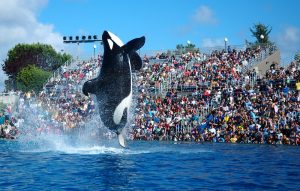After several years of backlash from animal activists and concerned patrons following the release of the 2013 documentary “Blackfish”, SeaWorld announced on March 17th, 2016 that “the whales currently in [their] care will be the last generation of orcas at SeaWorld”. This comes to shock for many as the orca shows have been drawing crowds to the parks since 1971.
This radical decision made by the successful amusement park chain may have been in part of the large decline in attendance, with 4.78 million visiting in 2015 in comparison to the 5.36 million that visited in 2012. This directly correlates with the release of the aforementioned “Blackfish”, which scrutinized many aspects of having orca whales in captivity, most notably emphasizing on the necessary space for the aquatic mammal in addition to the severing of matriarchal bonds.
This raises up an important question: How did SeaWorld get away with unethical practices for so long? To answer this question, we can look at how another company has been able to divert attention from controversy through marketing.
Similar to the backlash suffered by SeaWorld, popular fast food chain McDonald’s was faced with widespread public scrutiny following the release of the 2004 documentary “Supersize Me”. Interested in maintaining its growing sales pattern from the preceding years, McDonald’s took initiative before the documentary could even be released by phasing out “supersized” meals and by adding various salads and healthier options as a part of their “Eat Smart, Be Active” campaign. This move proved to be successful, with McDonald’s continuing their growth past 2005. The fast food chain continues to downplay the health effects of their food by marketing specific aspects of their brand, assuming the role of a restaurant combating the growing rates of obesity despite the notoriously unhealthy food that remains on its menu.
For many years, SeaWorld has promoted an initiative for the sanctity and protection of animals. Specifically, they claim to care for over “60,000 fish” and “7,000 other marine and terrestrial animals” in addition to being partners with various animal activism societies such as the World Wildlife Fund. From what it had appeared, SeaWorld was the amusement park which genuinely cared about the effects its parks have on the captive animals. Therefore, it had widely been assumed that SeaWorld had taken the necessary steps in order for orca whales to live naturally in captivity. SeaWorld was able to use these initiatives in order divert attention from its potentially unethical practices, just as McDonald’s did.
As such, we may not be seeing the bigger picture behind some companies. Many may be marketing a facade in order to hide possibly unethical aspects of their operation. That in itself I do not find ethical, but it may just be a standard practice concerning business ethics.
Word count of article: 450

